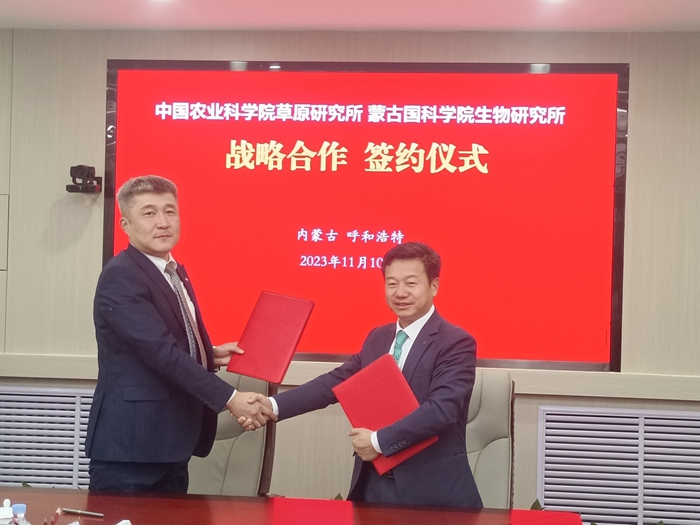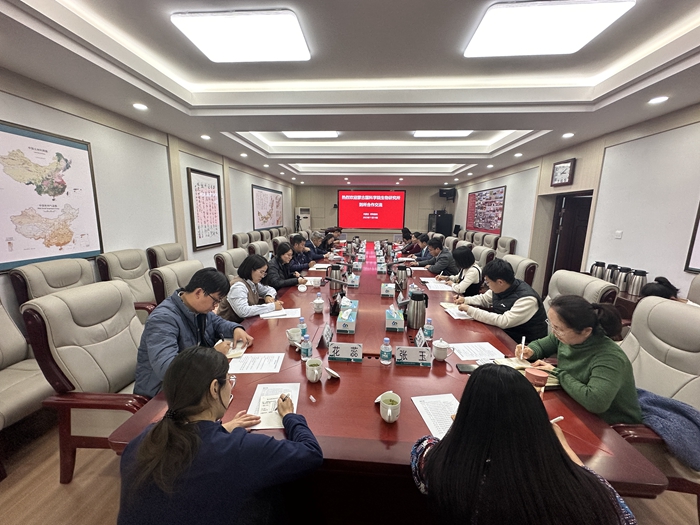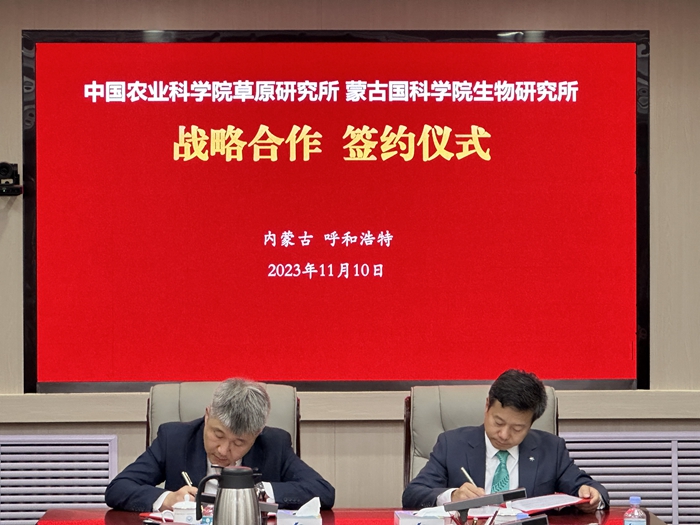Institute of Grassland Research of CAAS promotes comprehensive cooperation with Institute of Biology, Mongolian Academy of Sciences
On November 10, at the invitation of Prof. Lin Kejian, Director General of the Institute of Grassland Research of the Chinese Academy of Agricultural Sciences (IGR-CAAS), Prof. Gantulga Davaakhuu, Director General of the Institute of Biology at the Mongolian Academy of Sciences (IBMAS), visited IGR-CAAS for a collaborative exchange. The discussions focused on key areas such as monitoring and control of grassland biological hazards, rehabilitation of degraded grasslands and desertification prevention, as well as exchanges and joint training of personnel. A comprehensive cooperation framework agreement was signed between the two institutions. This follows a similar agreement with the Mongolian Institute of Plant Protection, marking another substantial collaboration with a national-level Mongolian scientific research institution. These collaborations are continually strengthening IGR-CAAS's international scientific partnerships under the Belt and Road Initiative to the north. They represent a pioneering effort in establishing a China-Mongolia transboundary cooperative mechanism for research and integrated management of grassland pests and desertification control.
Prof. Lin Kejian warmly welcomed the visit of Prof. Gantulga Davaakhuu and introduced the basic situation and scientific innovation progress of the IGR-CAAS, particularly highlighting the significant achievements in desertification monitoring and control, and biosafety, including talent teams, project platforms, and transformation of results. He emphasized the importance of continuing to strengthen substantial cooperation between both parties, especially in the field of grassland biological hazards. Prof. Lin pointed out that the recently concluded Third Belt and Road Forum for International Cooperation had underscored the importance of China and Mongolia continuing to work together to build a robust foundation for a shared destiny amidst a complex world, and to push for greater development and benefits for the people of both nations in the new era. The timing of this cooperation signing is opportune, marking a step forward in grassland and grassland plant protection technology innovation, and furthering mutually beneficial China-Mongolia cooperation. Mongolia is also a major source of sand and dust storms to China. Therefore, enhancing cooperation in monitoring degraded grassland resources, combating desertification, and controlling biological hazards is crucial for effectively managing regional sources of sand and dust, as well as a shared commitment to proactively addressing climate change and promoting green development.
Prof. Lin Kejian emphasized that both parties should view the framework cooperation agreement as a fresh starting point and the needs of the Belt and Road international cooperation as a new phase. He urged for efforts to achieve new breakthroughs in areas such as technological innovation, talent cultivation, outcome provision, project application, the establishment of joint laboratories, and resource sharing. He stressed the importance of comprehensively enhancing the level of scientific innovation in the control of grassland biological hazards, particularly on the China-Mongolia border in the Mongolian Plateau, and further strengthening cooperation in the field of desertification prevention and control. Prof. Lin articulated the vision of building a bridgehead for China's northern opening and contributing to the Belt and Road Initiative through deepened and pragmatic grassland scientific and technological innovation.
Prof. Gantulga D. presented an overview of Mongolia's efforts in desertification control and grassland biological hazards prevention and research, as well as the primary research domains of IBMAS. He reflected on the solid foundation of cooperation already established with IGR-CAAS in the field of grassland biological hazards control. Prof. Gantulga noted that China and Mongolia share the Mongolian Plateau, with similar landscapes and habitats, and this dialogue has sparked further insights and identified additional points of synergy, thereby underscoring the urgency and timeliness for joint scientific innovation. The comprehensive cooperation framework agreement signed by both parties further cements and refines the areas and focus of collaboration. IBMAS is committed to adhering to principles of sincerity, pragmatism, and efficiency, and aims to enhance communication and collaboration, expand areas of cooperation, elevate the level of partnership, and innovate cooperative models. Together with IGR-CAAS, IBMAS seeks to jointly address transboundary biological disasters and sandstorms, earnestly promoting a more stable, long-term, and in-depth partnership.。
Over 20 representatives from IGR-CAAS attended the meeting.



-
 Apr 18, 2024Opening Ceremony of the Training Workshop on Wheat Head Scab Resistance Breeding and Pest Control in Africa Held in CAAS
Apr 18, 2024Opening Ceremony of the Training Workshop on Wheat Head Scab Resistance Breeding and Pest Control in Africa Held in CAAS -
 Apr 03, 2024IPPCAAS Co-organized the Training Workshop on Management and Application of Biopesticides in Nepal
Apr 03, 2024IPPCAAS Co-organized the Training Workshop on Management and Application of Biopesticides in Nepal -
 Mar 28, 2024Delegation from the School of Agriculture and Food Science of University College Dublin, Ireland Visit to IAS, CAAS
Mar 28, 2024Delegation from the School of Agriculture and Food Science of University College Dublin, Ireland Visit to IAS, CAAS -
 Mar 25, 2024Director of World Food Prize Foundation visited GSCAAS
Mar 25, 2024Director of World Food Prize Foundation visited GSCAAS -
 Mar 20, 2024Institute of Crop Sciences (ICS) and Syngenta Group Global Seeds Advance Collaborative Research in the Seed Industry
Mar 20, 2024Institute of Crop Sciences (ICS) and Syngenta Group Global Seeds Advance Collaborative Research in the Seed Industry
